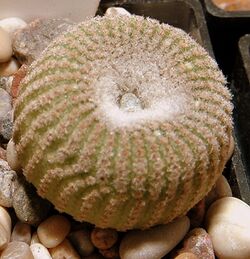Biology:Yavia
| Yavia | |
|---|---|

| |
| Scientific classification | |
| Kingdom: | Plantae |
| Clade: | Tracheophytes |
| Clade: | Angiosperms |
| Clade: | Eudicots |
| Order: | Caryophyllales |
| Family: | Cactaceae |
| Subfamily: | Cactoideae |
| Genus: | Yavia |
| Species: | Y. cryptocarpa
|
| Binomial name | |
| Yavia cryptocarpa R.Kiesling & Piltz
| |
| Synonyms | |
| |
Yavia cryptocarpa is a species of cactus (family Cactaceae) and the only species of the newly discovered genus Yavia.[2] The genus is named after Argentina 's department Yavi, Jujuy Province, where the plant is endemic to sparsely vegetated rocky slopes.[3] The plant is also sometimes put in the tribe Notocacteae. The specific epithet cryptocarpa refers to the plant being a cryptocarp. This means that the fruits are formed inside the plant's body, thus being only visible when the plant shrinks in the drought period.
Description
The species, with very tuberous roots, has a subglobular stem, has a cylindrical to inverted cone-shaped, compressed at the apex and wider at the top than at the bottom, green plant body that reaches heights of between 0.5 and 1.5 centimeters and a diameter of 1.3 to 2.5 centimeters (rarely 3 centimeters). Its general appearance is quite flattened and the upper part protrudes slightly from the ground. It measures from 3 to 4 cm in height by about 2 to 3 cm in width. The areoles are arranged on the tubers and have between 8 and 15 pectinated spines about 1 to 5 mm long. From them arise 8 to 15 pink-colored thorns, which become glassy-white with age. The flowers are pale pink although they can be white or pale purple. They measure 1 cm long by about 2 cm wide. The flower cup, which is up to 5 millimeters long and 2 millimeters wide, is bare. Perianth is cone-shaped. The outer, olive petals are spatulate, 4 millimeters long and 2.5 millimeters wide. The inner, lanceolate, 6 to 7 millimeters long and 3 to 4 millimeters wide petals are white to pink with a whitish edge. Flowering is diurnal and occurs at the end of spring. The fruits are about 2 or 3 mm wide and remain protected in the central depression of the plant for several months, being expelled at the end of spring of the following year, when the flower buds develop at the beginning of the rainy season.
The inverted cone-shaped, bare, small fruits are embedded in the apex depression and surrounded by the woolly felt of the young areoles. They contain few, dark brown and more or less oval seeds.[4]
Distribution
Yavia cryptocarpa is widespread in the north of the Argentine province of Jujuy in the border area with Bolivia at altitudes of around 3700 meters.
Taxonomy
The first specimens were discovered by Roberto Kiesling in February 1986. However, the specimens collected at that time were lost. It was not until 2000 that new specimens could be collected and cultivated. The first description, written together with Jörg Piltz, appeared in March 2001 in Cacti and Other Succulents, the magazine of the German Cactus Society.[5]
A nomenclature synonym is Blossfeldia cryptocarpa (R.Kiesling & Piltz) Halda (2003).
References
- ↑ "The IUCN Red List of Threatened Species". IUCN Red List of Threatened Species. 2010-09-21. https://www.iucnredlist.org/species/151951/580168. Retrieved 2023-10-23.
- ↑ "Yavia cryptocarpa R.Kiesling & Piltz". https://powo.science.kew.org/taxon/urn:lsid:ipni.org:names:320895-2#synonyms.
- ↑ Kiesling, R; O Ferrari (2003). "Yavia cryptocarpa – conservation action on a new and interesting cactus". British Cactus and Succulent Journal (British Cactus and Succulent Society) 21 (1): 20–25. http://www.bcss.org.uk/yavia.pdf. Retrieved 2007-06-24.
- ↑ Anderson, Edward F.; Eggli, Urs (2005) (in de). Das grosse Kakteen-Lexikon. Stuttgart (Hohenheim): Ulmer. p. 646. ISBN 3-8001-4573-1.
- ↑ "Au Cactus Francophone" (in fr). https://www.cactuspro.com/lecture/Kakteen-und-andere-Sukkulenten/Kakteen-und-andere-Sukkulenten-2001-3/page-3.de.html.
External links
Wikidata ☰ {{{from}}} entry
 |




